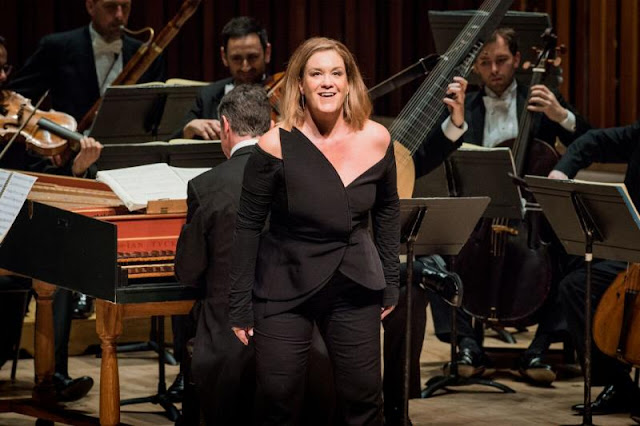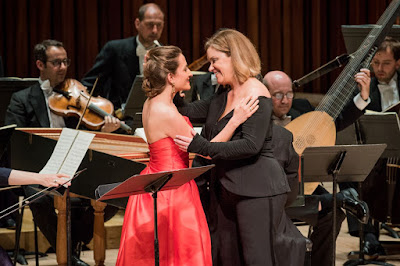 |
| Alice Coote, Harry Bicket & English Concert - Handel: Ariodante - Barbican (Photo Robert Workman for the Barbican) |
Reviewed by Ruth Hansford on May 16 2017
Star rating:
Strong performances from the sopranos & orchestra in this concert version of Handel's opera
 |
| Sonia Prina, Mary Bevan, Harry Bicket & English Concert (Photo Robert Workman for the Barbican) |
Ariodante is the Handel opera that has a happy ending a third of the way through. The hero, Ariodante, gets the girl (Ginevra) by rescuing her from the baddy Pollinesso. The baddy gets sidelined as the other girl (Dalinda) has a better offer from the nice tenor. Act Two is the dark centre, when the villain tricks the other girl into dressing up as Ariodante’s beloved and the hero sings one of the most heartbreaking arias in opera seria: ‘Scherza infida’. Then in Act Three the hero gets the girl back, the tenor gets the other girl, the baddy dies and the King throws a party.
This Barbican concert was not billed as a semi-staged performance, though there were ons and offs, the singers referring occasionally to the score but otherwise using the large empty paces either side of the band on the Barbican Hall platform. No director was credited in the programme. Apart from the two mezzos, Sonia Prina and Alice Coote, who seemed to have brought their own production with them, it was a fairly clear, simple performance in line with the classification of the opera as ‘German pastoral’.
Musically it was mostly wonderful.
The two sopranos, Christiane Karg as Ginevra and Mary Bevan a late stand-in as Dalinda, sounded distinctive and produced a wide range of emotions as demanded by the music. Karg stood still and looked out blankly at the audience for her mad scene in the ‘balli’ at the end of Act Two, and it was really all we needed (though we needed the surtitles to figure out what vowels she was singing at the beginning of the show). The music did the work of telling us she was losing her mind. The wholesome tenor Lurcanio was ardently sung by David Portillo. The King was Matthew Brook – devastating in his Act Two aria. And the band were terrific: filthy brass playing, unsettling syncopations and perfection in the orchestral entr’actes. The pacing was ideal and it certainly didn’t feel as though the evening was as long as it was (starting at 7 and ending at 10.45 with a few disappearances from the audience after the second interval). Though Bicket was conducting and playing harpsichord with his back to the singers mostly, the telepathy was pretty impressive.
 |
| Christiane Karg, Alice Coote & English Concert (Photo Robert Workman for the Barbican) |
I am not just talking about the frocks either. Coote was wearing an asymmetrical, very low-cut top (by Vivienne Westwood, I hear) and Prina was in what looked like sequinned, semi-see-through jogging bottoms. Vocally they hammed everything up to within an inch of its life. Prina, firing off low coloratura and spitting her fury, almost got away with her caricature. And in any case, Polinesso was dead before the end. But Coote’s idiosyncratic singing included a repertoire of unmusical sounds and she pulled her face and body into the most distracting shapes. We couldn’t tell what to make of her character. ‘Scherza infida’ should be the still ten minutes at the heart of the opera, but I found her performance unwatchable.
One last observation. Call me shallow, but really someone should have told them about shoes. Not just David Portillo’s brown shoes; the women wore stilettos à la Melania Trump. Fine if you’re standing still, but if you’re going to walk elegantly and silently across the Barbican stage you need to think about what you put on your feet.
Reviewed by Ruth Hansford
Elsewhere on this blog:
- Side by side: Brahms, Schumann & Cheryl Frances-Hoad at Wigmore Hall - concert review
- Lyrically moving: Nick Pritchard in title role of Handel's Jephtha - concert review
- Doubly valedictory: European Union Baroque Orchestra at the London Festival of Baroque Music - concert review
- Tremendous verve: Verdi's Oberto from Heidenheim Opera Festival - CD review
- Exquisite but reverential: Monteverdi's L'Orfeo at the London Festival of Baroque Music - Opera review
- Not just the scribbling of a person on the way to greatness: Elijah Moshinsky talks about Verdi's original 1847 version of Macbeth - interview
- Vibrant music making: Martynas Levickis at Club Inegales - concert review
- Spanish Renaissance: The Tallis Scholars in Iberian mood - Concert review
- Late night club? Jasmin Toccata's Late o'Clock Baroque at London Festival of Baroque Music - concert review
- Thought-provoking: Benjamin Appl and James Baillieu's Heimat - CD review
- Home

.jpg)









No comments:
Post a Comment